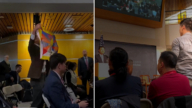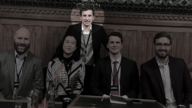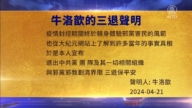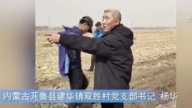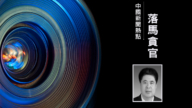【新唐人2014年12月16日訊】中共機關刊物《求是》雜誌的下屬刊物《紅旗文稿》,在今年第23期刊發了一篇所謂「階段性研究成果」的文章。這篇文章對於微博等社交網絡上「反黨」言論,表達了危機感。儘管當局一直想方設法管制網絡言論,但中國民眾卻越來越加緊思考的腳步。
《紅旗文稿》這篇文章,題為「維護微博意識形態安全必須糾正的幾種傾向」,是北京聯合大學人文社科部的李艷艷,就北京市和中央撥款的兩項科研項目發佈的所謂「階段性成果」。
文章開頭就承認,否定中共領導和社會主義制度的觀點在微博平臺上擴張傳播,對社會主義意識形態造成嚴重衝擊。
中國網民對「普世價值」的認同程度,讓文章表示非常擔心,並說已經觸及到了中共意識形態的根本。文章特別舉了三個網路大V所謂「反黨」的言論:例如今年3月28號,一條某知名經濟學家的微博獲得了超過400萬人次的閱讀量,博文中說「百年前共產主義風靡全球,多少熱血青年為此拋頭顱灑熱血。可是經過百年的實踐,證明此路不通」。
另外在今年9月4號,一位擁有2000多萬「粉絲」的知名地產商人發佈微博,直接抨擊馬克思是「洗腦」大眾。
還有一位是擁有260多萬「粉絲」的著名演員,在微博上公開質疑「沒有共產黨就沒有新中國」,這名演員說「沒誰都有中國」。
雖然文章沒有直接點出三位微博大V的名字,但不少中國網友根據文中的信息,指出他們分別是在新浪微博擁有234萬粉絲的著名經濟學家茅於軾、有2778萬粉絲的地產商任志強,和有282萬粉絲的著名演員孫海英。
安徽異見人士瀋良慶:「他這說的也是老實話啊,其實就是這種情況。因為你本身就不受歡迎麼,你還不讓人說話。它就這樣,剝奪人家的表達自由。」
廣州民主人士徐琳:「在我看起來是一種高級黑,就是哀鳴。我覺得這是好事情,她這樣一說的話,讓更多的人知道現在的輿論情況。」
文章一再提到了在西亞北非國家發生的「顏色革命」中,推特的作用,認為微博的傳播功能和效力不能低估。
中共對意識形態的危機感,和網絡言論可能引發「顏色革命」的警惕,近期還不止在這一篇文章中體現出來。
中共鷹派少將羅援,10月份在《經濟導刊》舉辦的研討會發言中,提到「輿論陣地失守」已經成為一大問題,他說:「現在一些網站上,你不罵共產黨,不罵毛澤東,都不好意思上這個網。」
羅援也提到「顏色革命」,並形容在網絡批評中共和現行制度的人,今後就是「顏色革命」的基礎。
原《河北人民廣播電臺》編輯朱欣欣:「反映出共產黨確實是民心喪盡,他們在輿論上也知道不佔優勢,儘管他們控制了一些所謂的媒體,把很多聲音都壓制住了,但他也知道,真實的聲音、狀態是改變不了的。」
這種危機感使得當局在近幾年中,對網絡社交平臺,和新媒體的管制越來越嚴厲,試圖把民間「反黨」的聲音最小化。
中國民間維權非政府組織「民生觀察」負責人 劉飛躍:「甚至像官方的,門戶網站,像網易,它的微博都不得不取消了。另外最近不是對網絡跟帖嗎?連跟帖也不放過了,也要審查。中國的網絡自由度下降是不爭的事實。」
儘管當局仍然將「反黨」這個敏感詞視為「大逆不道」,但是在民間,它已經不再是一個禁詞。
徐琳:「難道不能反的嗎?有意見就可以提,覺得它不好,就可以批評它。認為它不好,就可以要求它下臺,這個是正常的一個現象麼。」
安徽異見人士瀋良慶指出,實際上,真正的民怨,比起受到官方批評的微博上大V的言論,還要強大的多。然而當局連善意的提醒都不能容忍,正在扼殺最後一點空間。
採訪/田淨 編輯/尚燕 後製/鍾元
Communist Mouthpiece Opposes Anti-Party
The 23rd issue of the Party bi-monthly, Qiushi,
discussed current Party research achievements.
In particular, it illustrated a so-called crisis,
the anti-party phenomenon on Internet posts.
Despite the online censorship, mainlanders are getting
increasingly expressive in their thoughts and ideas.
Published by Li Yanyan from the Department of Social Sciences
at the Beijing Union University, the research was a central and
municipal funded project.
The article was entitled, “The Several Tendencies That Must Be
Corrected to Maintain Microblogging Ideological Security."
The article admitted that online posts of negative views
on the CCP leadership have had a severe impact
on socialist ideology.
The article expressed, Chinese netizens’ identification
of universal values has affected the CCP’s fundamental ideology.
It specifically took three influential Chinese bloggers’
anti-party remarks as examples.
On March 28, an economist’s blog stated, “Communism was
so popular a century ago that numerous passionate young people
were willing to shed their blood for it.
However, a century’s practical experience has proved it
to be a dead end."
This blog attracted more than 4 million online readers.
On Sept. 4, a real estate businessman with over 20 million fans
bluntly criticized online that, Marxism “brainwashes" the public.
An actor with more than 2.6 million online fans openly
challenged the so-called “Without the CCP, there would be
no new China."
The actor commented, “With or without, China will still be there."
Though the article didn’t directly name the three big Chinese
bloggers, Chinese netizens have identified them as economist
Mao Yushi, realtor Ren Zhiqiang and actor Sun Haiying,
who have 2.34 million fans, 27.78 million fans,
and 2.82 million fans on Sina Weibo, respectively,
These posts have been deleted but still traceable
on the Internet outside of China.
Shen Liangqing, a dissident in Anhui Province: “What was said
was actually the truth. They don’t even allow others to comment.
It deprives people of freedom of expression."
Xu Lin, a democracy activist in Guangzhou: “In my view,
it’s a super whining. I think this is good.
Her publication in fact made people realize
the current situation of public opinion."
The article mentioned repeatedly the role of Twitter in the
“Color Revolution" occurring in West Asia and North Africa.
It warned not to underestimate the function and effect
of online posts.
The CCP’s sense of ideological crisis and the concern
of “Color Revolution" triggered by online speeches
are recently also seen in other publications.
Chinese hawk Major General Luo Yuan acknowledged
“the loss of the public opinion battlefield" in a seminar
held by the Economic Herald magazine in October.
He said: “Nowadays, on some websites, if you don’t criticize
the CCP or Mao Zedong, you would be afraid of visiting
the websites.”
Luo Yuan also mentioned the “Color Revolution."
He described those who criticized the CCP and the regime
are the foundation of the “color revolution" in the future.
Zhu Xinxin, former editor of the Hebei People’s Radio:
“It shows that the CCP has certainly lost people’s confidence.
They do know that they haven’t got the advantage in terms
of public opinion.
Though they control some of the so-called media,
and have suppressed many voices,
they also know that the true voice will never be changed."
This sense of crisis has caused even tighter and stringent online
censorship, trying to minimize “anti-party" voices.
Liu Feiyue, organizer of Chinese civil rights NGO
“Livelihood Watch: “Even official portals, such as the Netease,
have had to cancel their microblogging services.
In addition, even the popular online follow-up comments
are no exception. They are subject to censorship as well.
It is an indisputable fact that China’s Internet freedom
is declining."
The regime continues regarding “anti-party" as “outrageous,"
despite its popularity among the general public.
Xu Lin: “Don’t we have the right to have opposite opinions?
As long as we have different opinions, we should speak them up,
and criticize them.
As long as we think someone is not good,
we can ask him to step down.
This should be a normal phenomenon."
Shen Qingliang pointed out that, in fact, the real grievances
among the general public are stronger than the online posts.
Even these gentle reminders cannot be tolerated by
the authorities.
Apparently, the last outlet is being blocked.
Interview/TianJing Edit/ShangYan Post-Production/ZhongYuan



